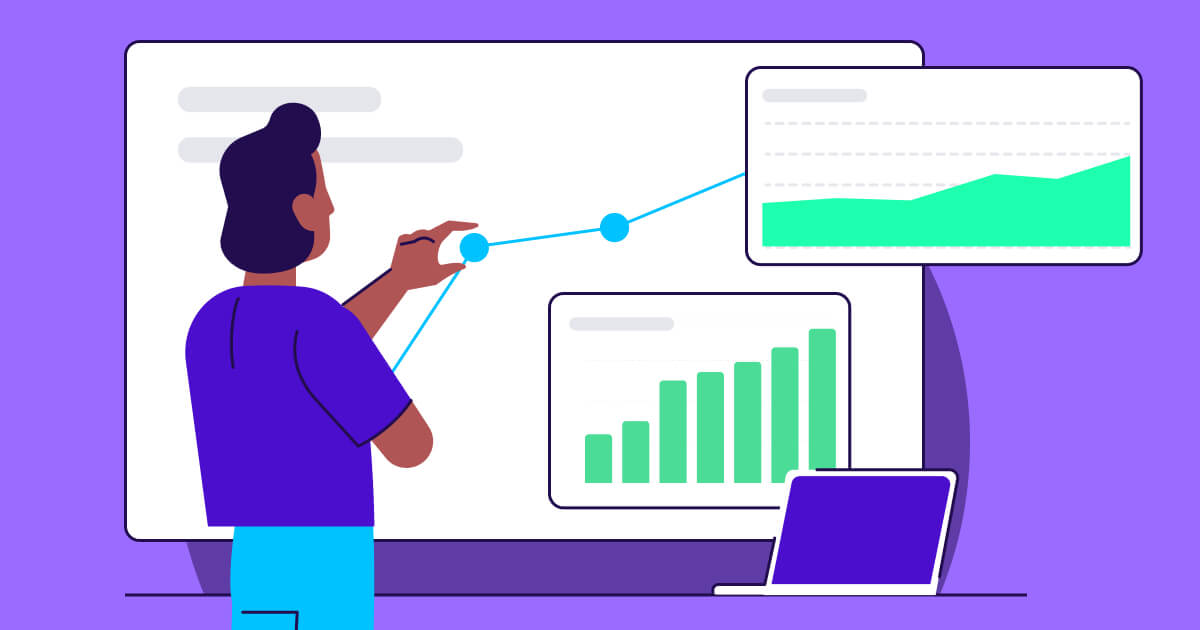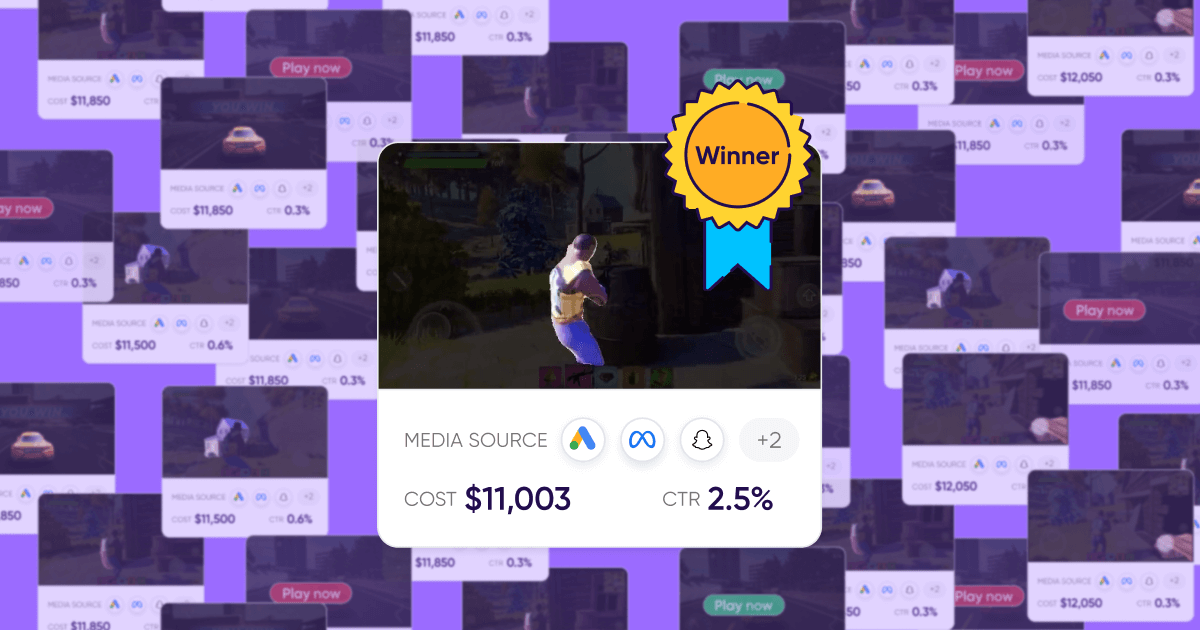
Got an app? Now what? Here’s how to increase app downloads
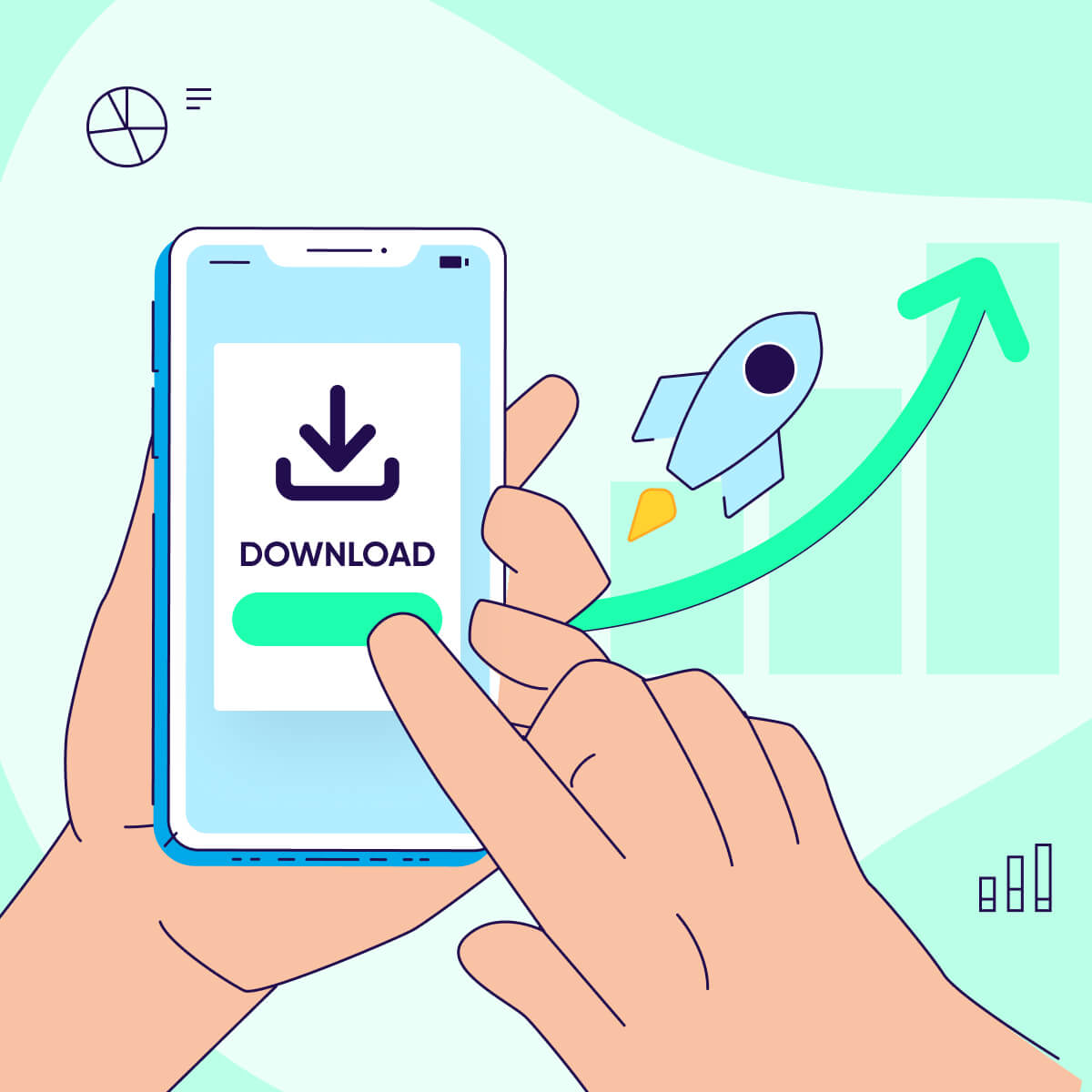
The old saying “if you build it, they will come” won’t work in today’s competitive mobile app market, even if an app can solve world hunger, global warming, and the healthcare crisis in one fell swoop. With a combined total of more than 5.6 million apps in the Apple App Store, Google Play Store, and Amazon Appstore, you must market your app strategically to attract users and drive downloads. Here’s how.
Six strategies to increase app downloads
You can’t be a one-trick pony in the app marketing world. Various strategies must work together to entice users to hit the install button. Here are our favorite ones:
1. Capture attention with visual elements
While we don’t want to judge a book by its cover, you must make a positive first impression in mobile app marketing by using attractive visuals to show users what they can expect from your app.
Design an attractive app icon
Your app icon is probably the first thing users see in app store search results. It can help you stand out, capture attention, increase click-throughs, and drive downloads. Think of the most popular apps and their icons — what do they look like, what do they say about the brand, and how do they make you feel?
A well-designed app icon should be attention-grabbing, align with your brand image, communicate a clear message, and represent your app’s main functions or unique selling points. The design should be simple with minimal text to avoid looking cluttered. You may also want to research your competitors’ icons and choose a palette that helps you stand out in relevant search results.
Use eye-catching photos and videos
Users take just a few seconds to decide if they want to click on a listing when they scroll through app store search results. Strong visuals can help you grab their attention and increase click-throughs. After you get them to land on your app listing, you must also demonstrate how your app can solve their problems or help them achieve their goals.
Use high-quality screenshots to illustrate key features and include demo videos to show how your app works. In particular, videos are very effective for boosting conversion rates. An intro or explainer video on your website, social media, or app store listing can help generate more interest and get more people to visit your app store page and download your app.
2. Prioritize app store optimization (ASO)
Apple found that 70% of App Store visitors use search to discover apps, while almost 65% of downloads happen directly after a search. Implementing effective app store optimization strategies can help you rank high in relevant search results and get found by your ideal audiences.
Conduct keyword research
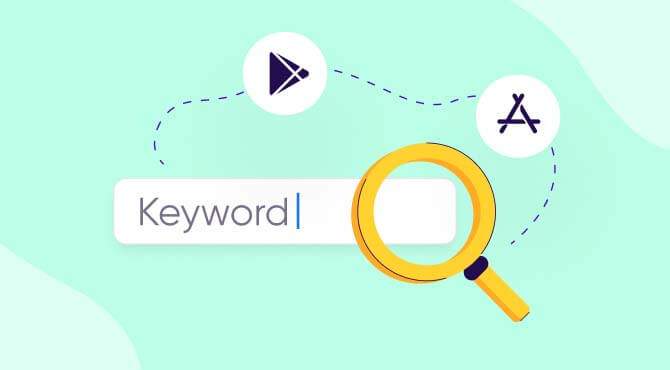
Before optimizing your listing, you must know what keywords to target. Start with a comprehensive keyword research process by brainstorming a list of potential keywords, expanding on that list, understanding the competitive landscape, and analyzing each key phrase for search volume (traffic), competition (difficulty), and relevancy.
Check out this post for the nuts and bolts of ASO keyword research.
Identifying the right keywords is a delicate balancing act. Your final keyword list should have a good mix of high-volume and long-tail keywords. While you should include the most relevant search terms in the app name and as many keywords as possible in the subtitle and description, remember that keyword stuffing is a big no-no.
Understand the algorithms
Apple App Store and Google Play Store use different algorithms to rank their search results, so you must adapt your ASO strategy for each platform.
Some key differences are:
- Apple has a keyword field while Google doesn’t.
- Google uses keywords in the long description as a ranking factor, but Apple doesn’t.
- Backlinks from high authority sites can earn you a higher ranking in Google Play Store, but don’t affect Apple App Store.
Besides understanding how each platform ranks key terms in each field (app name, subtitle/short description, keyword field, long description), you must consider the context. For example, Google Play Store’s search results only display a listing’s title and icon, so your app name must be descriptive. You can be more creative with your Apple App Store title because the subtitle and screenshots in search results can provide more information to drive click-throughs.
3. Boost your reputation with social proof
Testimonials can help increase conversion rates by 34%, while 98% of consumers indicate they read company reviews before purchasing. You can increase app downloads by adding social proof to your marketing strategy.
Ask for ratings and reviews
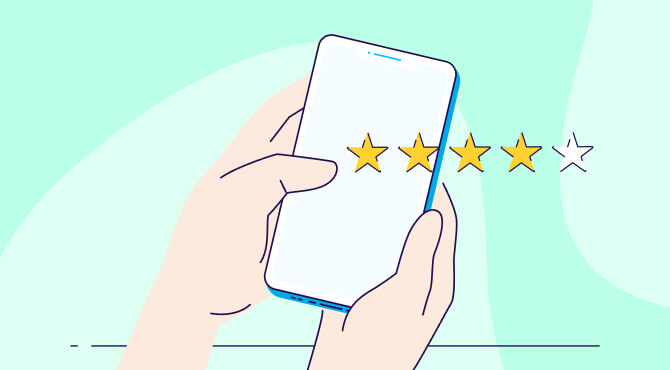
90% of consumers consider star ratings when evaluating an app, and 79% check app ratings and reviews before downloading one. Moreover, recent ratings and reviews can help boost your ASO, build credibility, and increase organic downloads.
However, don’t be tempted to post fake reviews, which could get your listing suspended. Instead, give users a nudge to share their opinions. For example, you could incentivize them to leave a review in exchange for access to premium features.
Also, asking for ratings at the right time can increase your chances of getting positive reviews. For instance, send users an in-app message or email after they accomplished a task in your app. Remember to include a link to the app listing so it’s easy for them to post their ratings.
Build trust with influencer marketing
60% of marketers say that influencer marketing has a higher return on investment (ROI) than traditional advertising (for example, it’s 11 times that of banner ads). Consumers trust the opinions of influencers, such as popular YouTube vloggers or tech bloggers. Getting them to rate or review your app in a video or an article can give you instant credibility and drive more downloads.
The good news is that you don’t have to spend an arm and a leg to partner with celebrities. You can reach niche audiences cost-effectively by working with micro-influencers who have built a loyal following and are trusted experts on a specific topic. You could even provide coupon codes for them to share with their fans so more people will try your app.
4. Localize your app
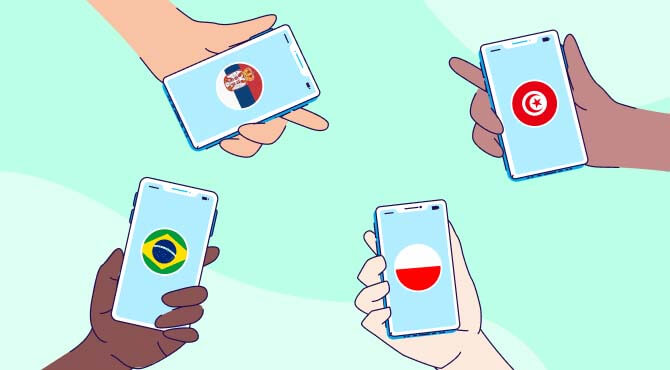
If you’re launching you app in multiple markets, it’s crucial to localize your app content and listings to appeal to users in each locale. An app that fails to localize its content for the local audience can lose up to 13% of users. Plus, localization (l10n for short) can help you drive 47% more search traffic and increase conversions by 20%.
Go beyond translation
Content translation is just one step in your app localization. You must also consider the context and visual elements to deliver a compelling experience to users in each market. How will cultural references and slang translate into the target language? It’s also worth using icons with universal meaning instead of graphic text to simplify asset production and management.
Don’t forget the transactional elements — you must localize everything from form fields (like addresses) and payment methods to date/time format and currencies. Hire a local team to review all the pieces before launch to ensure that your app delivers a smooth user experience and adheres to each locale’s regulations.
Localize your app store listing
Audiences in different locales may talk about their needs and problems differently. Keywords that work well in your home market may not be as effective in a foreign market, so a direct translation may not hit the mark. As such, you should invest in keyword research for each locale to inform your ASO strategy.
You’ll also need testimonials and reviews from local users to build trust and credibility while boosting your ASO. If you’re new to the market, invest in paid search campaigns to increase brand awareness and drive initial traffic, which can help you get onto app store algorithms’ radar and gain traction in the local market.
5. Increase brand exposure
Cast a wide net to get in front of more potential users — that means breaking out of the confines of the app store and meeting your target audience where they are online and offline.
Launch omnichannel promotional campaigns
Establish an online presence through various touchpoints with content marketing, email marketing, SMS marketing, search engine marketing, and social media marketing. If you’re preparing for an initial launch, set up a lead capture mechanism on your website and grow a subscriber list. Then, you can build buzz and drive more downloads as soon as your app is available in the app store to boost your ranking.
Besides your own website and social media profiles, share content, participate in discussions, and build a following on platforms such as Reddit and Digg. You can also post your app on directory sites and submit guest posts to high-authority blogs and relevant magazines to raise your brand profile.
Build an in-app community
Building a vibrant in-app community can help you retain users and get referrals. Besides interacting with users via in-app messaging, you can provide voice and video chat features so community members can interact with each other and share user-generated content.
Live streaming is an increasingly popular way to entice new audiences to download your app. Incorporate live commerce, product demos, exclusive content, and watch parties into your app experience to drive downloads and engagement. You can also add interactive elements, like chat, to entice more users to bring their friends into the fold.
6. Track, analyze, and improve

Your app marketing campaigns probably won’t yield the best results right out of the gate. To increase downloads, you must continue to improve your strategy by collecting user data and using app analytics to improve outcomes.
Track the right metrics
Identify the most impactful key performance indicators (KPIs) based on your business objectives. For example, if your goal is to get more downloads, you should track the traffic sources that yield the most installs and double down on channels that bring you the highest quality leads. You can also analyze users’ devices and operating systems to inform your segmentation and paid ad strategy.
Use the metrics to gain critical insights into the number of app listing views, your conversion rate and cost per install, and the ROI of your app marketing campaign. Then, use the insights to A/B test various elements, such as copy and screenshots in your app store listing, creative for PPC ads, and audience segmentation for your email campaigns.
Optimize your pricing
A freemium pricing model offers an effective way to drive downloads without losing sight of the monetization component.
Making your app free to download helps get more users on board, enabling you to collect more data to inform your product roadmap and develop features that users want. It also helps you gain traction and get more reviews to boost your reputation.
Experiment with different freemium models to identify which works best for your audience. For example, some apps (like Dropbox) do well with a traditional freemium model where users can use limited features for free and pay to access more capacity. Meanwhile, others take the freeware 2.0 approach, in which the app is forever free, and monetization happens through ads or integration.
Building your app is the first step — now it’s time to put it out there and watch the downloads roll in. With these six tips up your sleeve, you’re ready to do just that.
Key takeaways
Increasing app downloads in today’s competitive market is challenging but not impossible. You can adopt these six key approaches to get in front of the right audience, build instant credibility, and continuously improve your results:
- Capture attention with visual elements, such as app store screenshots and app icons.
- Prioritize ASO through keyword research and adapt your strategy to each platform.
- Boost your reputation with social proof, such as ratings, reviews, and influencer marketing.
- Localize your app content and app store listing to appeal to local audiences.
- Increase brand exposure with omnichannel marketing campaigns and an in-app community.
- Track the right metrics and use analytics to understand your users and improve results.


